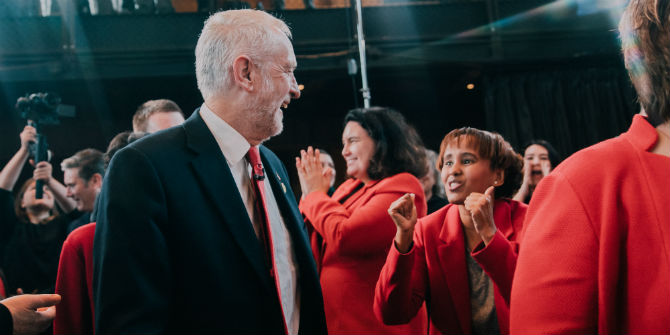The General Election will set Britain on the path to a hard or softer Brexit – or perhaps no Brexit at all. Ros Taylor (LSE) explains what each possible outcome means for the next stage of the UK’s withdrawal from the EU.
Conservative majority
Supposedly, a vote for the Conservatives is a vote to ‘get Brexit done’ – but the reality is more complicated. Boris Johnson will be able to formally leave the EU at the end of January and enter a transitional period in which he expects to negotiate a deal. But this period will end in December 2020 and the majority of experts believe it will be extremely difficult to secure a trade deal before then. If Johnson did, the agreement likely to be struck would still be very disruptive to British business; and if he did not, he has promised to exit definitively by December, raising the spectre of no deal.
The NIESR has analysed the benefit of the trade deals Johnson hopes to strike with non-EU countries and concludes it would be ‘small‘. The LSE’s Centre for Economic Performance has predicted how the different deals on offer would hit the UK economy.
However, the UK in a Changing Europe think-tank has suggested that Johnson might manage to extend the transition period by framing it differently for public consumption. The deadline for the negotiation of any extension is 30 June.
Labour majority
The Labour promise is to quickly secure a ‘better’ deal with the EU and then hold a second referendum, both within six months. The choice on the ballot paper would be between Jeremy Corbyn’s deal and Remain.

The UCL Constitution Unit says it would be extremely difficult to organise a referendum in less than 22 weeks, which makes this timetable very tight. Furthermore, the details of the Labour deal would be minimal and indicate a direction of travel rather than agreement on issues like trade. However, it would in theory keep the UK in the customs union, ‘aligned’ with the Single Market and accepting EU regulation in the same way that Norway does. The UK would also stay in various agencies and funding arrangements like Horizon 2020, and there would be security co-operation. Whether freedom of movement (FoM) would continue is unclear (it would be ‘subject to negotiations‘). Given the issue is no longer as politically salient as it once was, Labour may choose to enforce existing limitations on FoM more strictly.
Liberal Democrat majority
In this vanishingly unlikely scenario, Article 50 would be revoked and Britain would stay in the EU.
Hung parliament
The Brexit Party is polling too poorly to have a chance of picking up seats and going into coalition with the Conservatives, and the Democratic Unionist Party is very reluctant to prop up a Johnson government after he negotiated a deal that would create a hard border in the Irish Sea. It is just conceivable, but very unlikely, that the Lib Dems would countenance an arrangement with the Conservatives that guaranteed a second referendum. A hung parliament would therefore probably see Labour, the Scottish National Party, Plaid Cymru and potentially the Greens sharing power; the Lib Dems might engage in an informal arrangement. A second referendum would ensue. This is the scenario on which many pro-Remain groups are pinning their hopes.
This post represents the views of the author and not those of the Brexit blog, nor LSE.







As a exercise, let’s wargame Labour’s strategy.
Labour’s strategy is to strike its own deal with the EU, then put it to the electorate in a referendum. ‘Remain’ will be the only other option.
Corbyn has announced repeatedly that he will not campaign for the revised deal he strikes with Brussels. It will be a friendless orphan. Now, Brussels wants us to remain. So the EU has every incentive to offer us a truly appalling deal, which even the most blinkered Brexiteer could not countenance. This will make ‘remain’ almost guaranteed to win.
This scenario would certainly account for Labour’s election pronouncements, which seem to assume that Brexit will not be a political problem for much longer.
But suppose the Leavers decide they will not dignify an obviously rigged referendum with their votes? Suppose they organise a boycott, with shouts of ‘shame on you’ thrown at anyone who wants to enter the polling stations? ‘Remain’ would win by, say, six or seven million votes to nil.
Which leaves the interesting question of just how much legitimacy this referendum would possess. I would suggest the answer is ‘none whatsoever’. Leavers of all stripes would be outraged. Soft remainers would be none too happy either. Only the remainer fanatics would be satisfied. We would still be talking about Europe, I think, but the debate would be thoroughly poisoned by this crude attempt to fix an election.
Labour has just not thought through its ideas properly. Better pray it loses on Thursday.
David, you wrote “Which leaves the interesting question of just how much legitimacy this referendum would possess. I would suggest the answer is ‘none whatsoever’. ” I find it hard to argue with your analysis. So, evidently, does everyone else, unless there is a reply to your post waiting to be moderated.
However invoking divine help to bring about a Labour defeat seems to me a bit much. Apart from anything else, there are a lot of other things this election is about than Brexit (environment, inequality, and so on). Some of them might even be more important than Brexit. (I apologise for uttering the heresy on this blog of suggesting that whether or not the UK is part of the EU may not be the most important question facing the voters.)
This article gives a good concise summary of the likely national result of the 2019 General Election.
However I was struck by an article I read by a polling expert recently. He pointed out that that this is not only a national election, but also contains several important regional elections as well. In effect, because of the regional issues involved, and the distribution of party votes, seven regional elections are taking place. These are in Northern England, Central England, Southern England, Greater London, Wales, Scotland, and Northern Ireland.
As well as the national vote, it will be interesting to see how these regional elections play out.